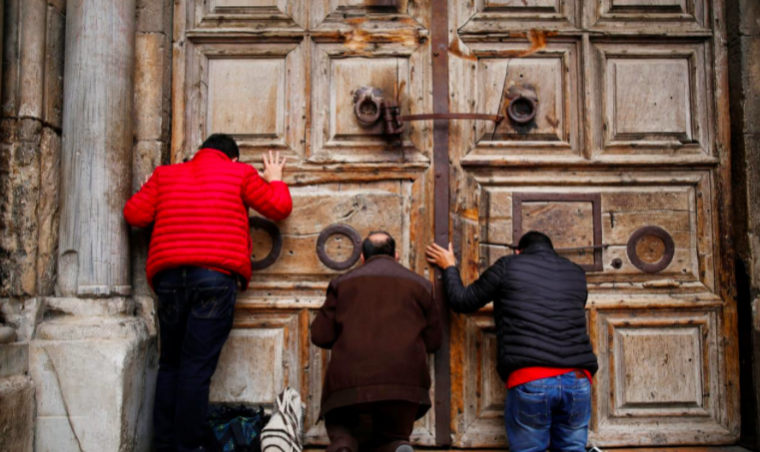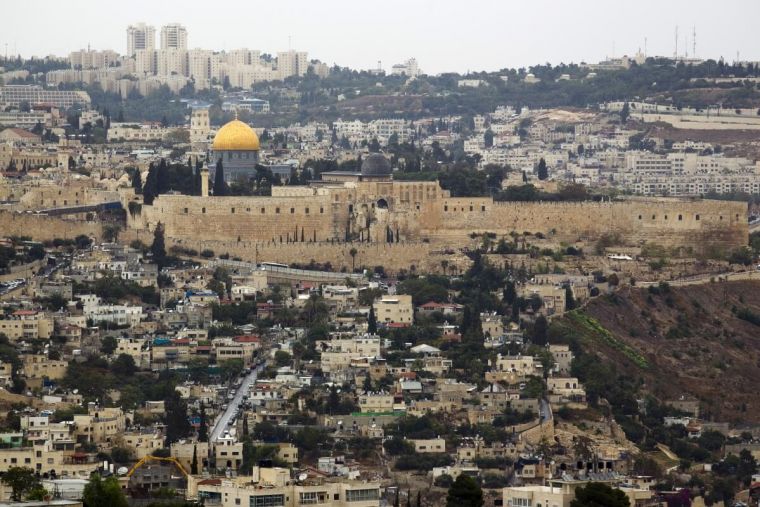Donald Trump is not our saviour: A Palestinian priest's perspective on Trump and Middle Eastern Christianity
As the Trump Administration has announced its recognition of Jerusalem as Israel's capital, the US Ambassador to Israel David Friedman decided to use the Holy Sepulcher to make a political point in support of Israel's control over the city.

He wished Christians a Happy Easter while tweeting that it was 'encouraging to see religions coming together, flourishing, in Jerusalem'. Only a few days later he was silent when defenseless Palestinians were being killed for peacefully demonstrating in Gaza. This only confirms that his Easter tweet aimed at misleading the reality of the Israeli occupation.
This week I visited the Church of the Holy Sepulcher, viewed by many as Christianity’s holiest site. Encouraging to see religions coming together, flourishing, in Jerusalem. Wishing my Christian friends good health and happiness on #GoodFriday and #Easter . pic.twitter.com/P8Z2QdYIwH
— David M. Friedman (@USAmbIsrael) March 28, 2018
The 'March of Return' that took place in Gaza is linked to the marking of 70 years of the Nakba. It is impossible to talk about the situation of Christians in the Holy Land without mentioning what happened in 1948 to dozens of Palestinian parishes, whose communities were expelled and never allowed to return. In 1948 Jerusalem had a population of about 31,000 Christians. Many of them became refugees during the Nakba and today the number has been decreased to less than 10,000.
After the Israeli occupation of East Jerusalem in 1967, the city began to be separated from the rest of the country. The surrounding Christian communities, such as Ramallah, Bethlehem, Jericho and Al Izzariya (Bethany), have been cut off from the city by a network of settlements, checkpoints, walls and other movement restrictions. This, in addition to several policies such as ID Revocations and denial of family reunifications, has pushed thousands of Palestinians out of the city, including many Christians, severely affecting our social fabric.
In order to enter Jerusalem, Palestinians need special military-issued permits. It has been noted how Palestinian Christians from Gaza under the age of 55 were banned from celebrating Easter in Jerusalem, only about 80 kilometers from their homes. As a Palestinian priest, the only way that I have to reach the Church of the Holy Sepulcher is through one of those permits. By obtaining one, it does not mean that one could necessarily do things like driving or sleeping over. In the case of Easter, obtaining a permit doesn't necessarily mean joy: crossing the Qalandia or the Bethlehem 300 checkpoints is a humiliating experience. Once inside, we are treated just like any other Palestinian.

Just a few days ago, young members of my community, alongside their families, were celebrating with joy the Palm Sunday procession when they were harassed, insulted and physically assaulted by Israeli Forces, detaining three young Palestinian Christians. They were not involved in any act of violence. Rather, they had raised a Palestinian flag, just like dozens of pilgrim groups were raising their national flags. The Israeli Police managed to turn the joy of Palm Sunday into a trauma for our children. This, unfortunately, was not an isolated case. We have seen how year after year there are more acts of discrimination against Palestinian Christians celebrating Easter in Jerusalem, including during Palm Sunday, Good Friday procession and the Holy Fire Saturday, known in Arabic as Sabt il Nour.
The US Administration, represented by Mr Friedman, has encouraged the Israeli Government to advance their policies against the rights of the Palestinian people, and particularly against the Palestinian presence in Jerusalem. Both Christians and Muslims suffer the consequences of this.
Instead of endorsing policies of coexistence and inclusivity that reaffirm the need to exercise equal rights in the city for Muslims, Christians and Jews, President Trump and his team have decided to encourage policies of discrimination and exclusivity by those who refer to Jerusalem as the 'eternal and indivisible capital of Israel'.
By 'taking Jerusalem off the table', as President Trump said, the US is not making any favour for the cause of a just and lasting peace. Let us be clear: President Trump didn't change anything on the ground. What he did though, was to tell the peoples of the region, and particularly to the Christian communities, that the US Administration cares very little about their fate. All parties have to respect the special inclusive identity of Jerusalem; it cannot and should not be under the sovereignty of one part or one religion. Equal rights to all should be respected.
As Mr Friedman talked about 'flourishing religions' in Jerusalem, I doubt that he can tell the difference between local Christians and foreign pilgrims, as he considers all Christians to be outsiders in the 'eternal capital of Israel'. Christianity is not foreign to this land, certainly not to Jerusalem.
We have been living here for centuries and we refuse all policies aimed at making us foreign aliens in our land. Our percentage may have decreased since 1948, but we are the 'salt of this earth'. Whoever cares about the situation of Christians in the Middle East, and particularly in Palestine, rather than encouraging unjust policies, should take concrete measures for freedom, justice, equality and dignity to be restored to all the inhabitants of the Holy Land. This is the only way for peace.
Fr. Jamal Khader is the parish priest of the Holy Family Roman Catholic (Latin) Church in Ramallah, a Palestinian city in the West Bank. He is the former rector of the Latin Patriarchate of Jerusalem Seminary as well as Dean of Arts of Bethlehem University.











